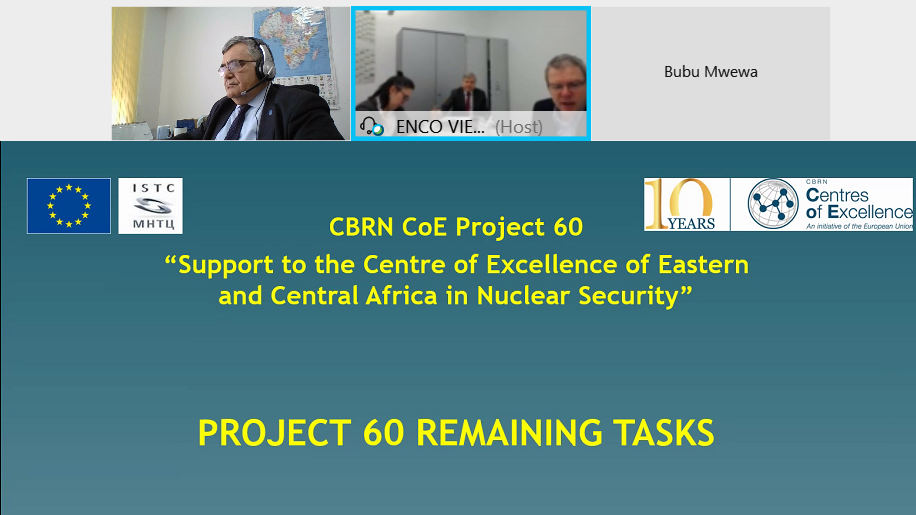 Project 60: Progress Achieved and Perspectives in Zambia
Project 60: Progress Achieved and Perspectives in Zambia
Wednesday February 10th, 2021
On 3 February 2021, ISTC took part in a video discussion among the Project 60 (P60) Team of experts and representatives of the Zambia Radiation Protection Authority (RPA), dedicated to the remaining actions for completion of the first stage of P60, and the problems of nuclear security of radioactive sources, including mobile sources, measures to prevent illicit trafficking, and other objectives of the Project’s second phase. The ENCO legal experts reviewed the 2011 Ionizing Radiation Protection Act, and other regulatory documents, presented by the Zambian side, and provided recommendations from security point of view. They also assessed the existing national capabilities for the safe and secure management, control and storage of radioactive sources and provided guidelines and templates on standard operational procedures and RN emergency response plan. Due to its geographical position Zambia has a central role to play with respect to the prevention and control of movements of the mobile radioactive sources across borders. On the national scale, RPA has concluded agreements with the Customs, the Road Transport Safety Agency and some training institutions, respectively, on exchange of information and joint approaches to prevent illicit movement of radioactive sources. Zambia is predisposed to favor regional arrangements on information sharing,…
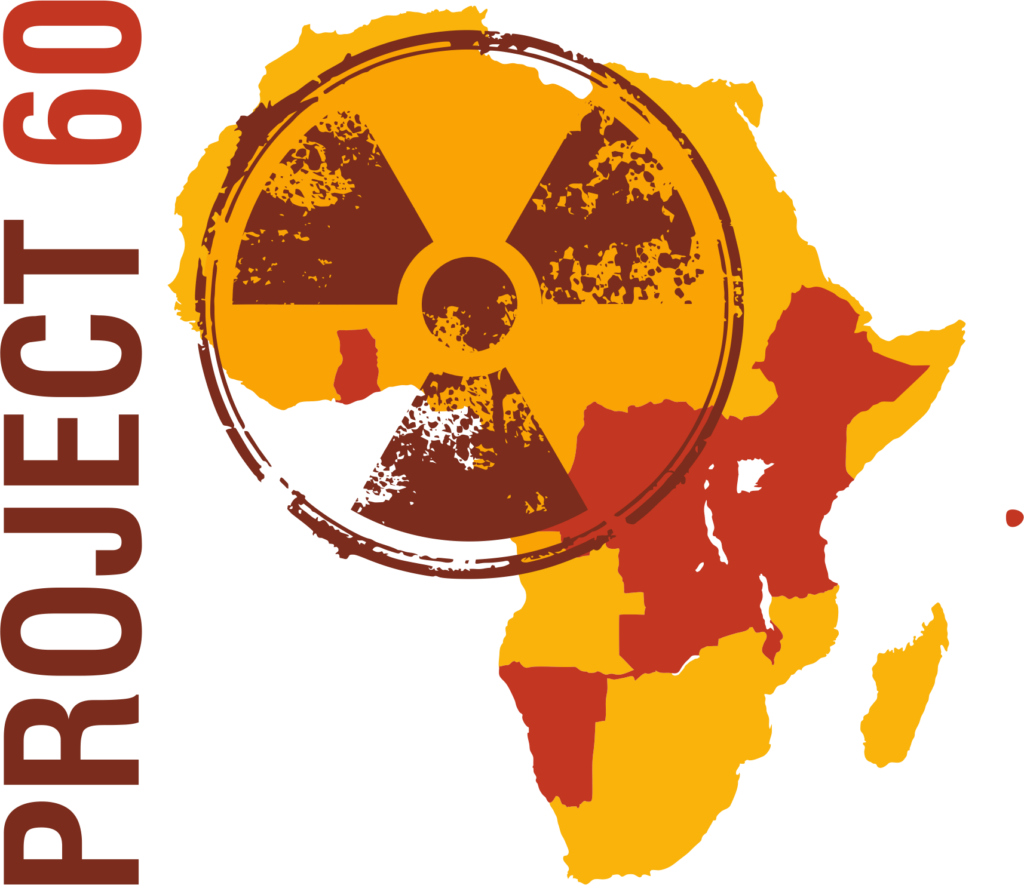 African Partners Determined to Further Improve Their Nuclear Security
African Partners Determined to Further Improve Their Nuclear Security
Monday January 11th, 2021
In 2020, despite the turbulent and uncertain global situation, the African countries participating in the EU CBRN ECA CoE Project 60 continued their long-term risk mitigation work that is at the heart of the Project’s objectives. During its first stage (2017-2020), the Project provided technical assistance to improve regulatory and institutional frameworks in line with international standards, to increase the capacities for safe and secure management of radioactive sources and control over orphan sources, and to prepare national RN emergency response plans and lists of assessed equipment needs. The second stage of Project 60 is focused on enhanced regional cooperation to prevent illicit trafficking of radioactive materials through border monitoring, and the creation of mobile teams for coordinated inspection of radioactive sources at border crossings. The Team of experts provided advice through remote communication.[i] A Table for comparative analysis of existing laws and regulations in the Project participating countries was created using as benchmarks relevant international instruments. The resulting recommendations were based on the principles of prime responsibility, graded approach, defence in depth and risk-informed approach. The challenges become even greater in transboundary transport or in trade in sources. IAEA safety and security requirements need to be observed universally. To…
 Project – 60 Steering Committee Reviews Progress in Implementation
Project – 60 Steering Committee Reviews Progress in Implementation
Wednesday October 14th, 2020
On 14 October 2020 the Steering Committee of the EU CBRN CoE Project 60 convened its 8th meeting to review the remaining elements for the completion of the initial objectives and to consider the conduct of some activities, that can be performed remotely, under the enduring pandemic conditions. Silvia Bottone, EC DEVCO Program Manager, welcomed the resilience of the CoE network that allowed Project 60 to make progress despite the challenging pandemic conditions and travel restrictions. She emphasized that countering the illicit trafficking of radioactive material - which is the core objective of the Project’s second stage - requires further improvement of the regional collaboration among the participating countries. ISTC ED David Cleave noted that the Project continues to be the flagship of EU activities on nuclear security in Africa. It accumulated experiences that deserve sharing and multiplying. The upcoming Review Conference of the amended Convention on the Physical Protection of Nuclear Material offers an opportunity for that. Bojan TOMIC, Principal Consultant, ENCO, echoed that notion. He reminded that the initial P-60 Work plan comprised a workshop dedicated to the achieved regulatory improvements. Under the prevailing circumstances an online workshop could be organized to be followed by other online events…
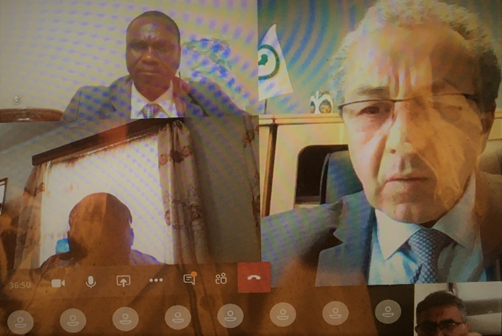 African and Kazakh Nuclear Experts Exchange Experience in Exploration of Uranium Resources
African and Kazakh Nuclear Experts Exchange Experience in Exploration of Uranium Resources
Wednesday September 30th, 2020
On the eve of the IAEA GC64, convened in Vienna from 21 through 25 September 2020, ISTC supported the African Commission on Nuclear Energy (AFCONE) in the organization of an online discussion among experts on the topic African Uranium Resources: Exploration, Exploitation and Cooperation Opportunities. The event attracted the attention of approximately fifty experts from AFCONE, from the IAEA, from African countries as well as from Kazakhstan. The audience included government nuclear regulators, industry representatives and operators in the nuclear energy field, professional and research communities, academia, youth organizations. In his opening remarks Dr. Messaoud Baaliouamer, AFCONE Executive Secretary, recalled that one of the main functions of AFCONE is to facilitate the exchange of information and the development of regional and sub-regional programs for co-operation in the peaceful uses of nuclear science and technology, and to promote international co-operation with extra-zonal States. Against the background of rapid economic and population growth in Africa and the challenges of the climate change, nuclear power should be considered an important component in the energy mix strategies of African countries. This is already the case in several countries: South Africa, Egypt, Ghana, Nigeria, Kenya and other newcomers. The AFCONE interest in the Uranium extracting…
 Videoconferences carried out with six P-60 participating countries ( DRC, Ethiopia, Kenya, Malawi, Seychelles and Uganda) on the implementation of Project 60 and its extension
Videoconferences carried out with six P-60 participating countries ( DRC, Ethiopia, Kenya, Malawi, Seychelles and Uganda) on the implementation of Project 60 and its extension
Wednesday August 19th, 2020
Videoconferences carried out with six P-60 participating countries ( DRC, Ethiopia, Kenya, Malawi, Seychelles and Uganda) on the implementation of Project 60 and its extension In order to assess the progress made in the implementation of the initial P60, to present the main parts of its extension and to gain some information necessary for the implementation of this extension, an email was sent on 22 June 2020 by ENCO, together with a questionnaire of a few pages to be filled in by each of the PCs of P60. It was requested to fill in the questionnaire and to send it back to ENCO for assessment before holding individual video conferences (one with each PC). There was a first batch of answers from the PCs, and respectively, the videoconferences could be conducted for DRC (24 July 2020), Kenya (24 July 2020), Uganda (23 July 2020), Ethiopia (22 July 2020), Seychelles (22 July 2020), and Malawi (13 July 2020). It is expected to receive soon the other questionnaires filled in by the remining countries and to find dates to conduct with each of them the individual video conferences. Each video conference was structured the same way: 1. Introduction part with a presentation…
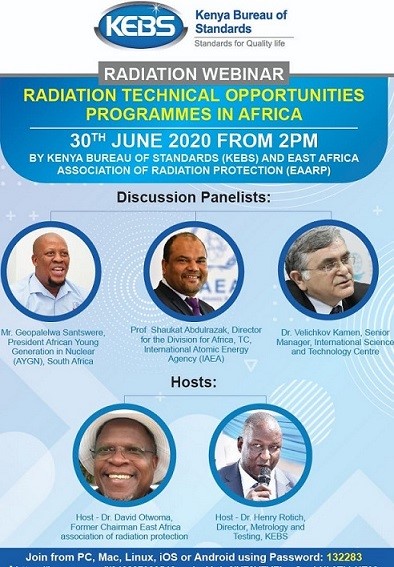 ISTC takes Part in a Kenya Bureau of Standards Webinar for African Partners
ISTC takes Part in a Kenya Bureau of Standards Webinar for African Partners
Wednesday July 1st, 2020
At the invitation of Dr Henry Rotich, Director, Kenya Bureau of Standards (KEBS) and Dr David Otwoma, former Chairman, Eastern Africa Association of Radiation Protection (EAARP), ISTC took part in a webinar entitled Radiation Technical Opportunities Programmes in Africa that attracted the attention of more than a hundred and twenty nuclear experts from Kenya and other African states. Inaugurating the event on 30 June, Dr Henry Rotich appealed to the participants to help map better solutions for peaceful nuclear applications in the country and the East African region. He called for identification of an IAEA-designated centre in Kenya, for which the KEBS could serve as the backbone. KEBS maintains good partnership relations with ISTC, which supported KEBS seminars and other initiatives. On KEBS’s invitation ISTC Senior Management delegation, led by Ambassador Ron Lehman, the Chairman of the Governing Board, visited Kenya a year ago to advocate at various line ministries the adhesion of the country to ISTC, and to encourage potential stakeholders in that partnership. Dr David Otwoma, who mediated the webinar, is the Chief Analyst and deputy Director of the National Commission for Science, Technology and Innovation (NACOSTI), the Kenyan government institution under the Ministry of Education and Science,…
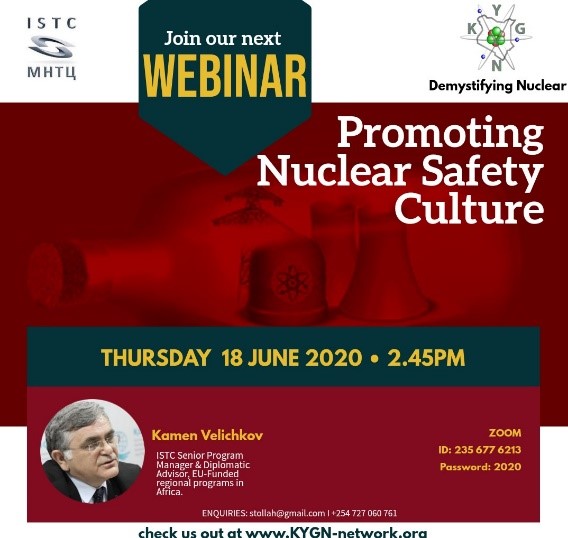 ISTC joins Kenyan Young Generation in Nuclear for a Webinar on Nuclear Safety
ISTC joins Kenyan Young Generation in Nuclear for a Webinar on Nuclear Safety
Thursday June 18th, 2020
The Kenyan Young Generation in Nuclear, a longstanding partner of ISTC in spreading sound nuclear culture in Africa, has organized a series of webinars do discuss the prospects for nuclear science and technology in Africa, to advocate for better nuclear education and to promote the need of nuclear safety and security across the continent. On behalf of ISTC, Dr. Kamen Velichkov, ISTC senior program manager and diplomatic adviser, talked about the EU-funded regional projects in Africa, and the ABC of establishing and maintaining nuclear safety procedures, policies and practices. He also emphasized the accumulated experience and trust after several partnership events that KYGN helped organize in Kenya with ISTC’s assistance, such as – the launch of the African Youth Generation in Nuclear (2017), the international integrated workshop on nuclear advocacy and communication (2017), the working visit of the ISTC management with a series of high-level talks and a special public event in Nairobi (2019). KYGN is one of the institutional partners that work to make a viable and possible the Kenyan membership in ISTC. KYGN leadership has organized the series of webinars with the aim to disseminate information and debunk the myths surrounding nuclear science and technology. The primary target…
 The Titans of Nuclear Podcast interviews Dr. David Otwoma, an ISTC-affiliated Expert from Kenya
The Titans of Nuclear Podcast interviews Dr. David Otwoma, an ISTC-affiliated Expert from Kenya
Wednesday June 10th, 2020
Bret Kugelmass, the host of the Titans of Nuclear podcast that features experts on nuclear energy, interviewed on 10 June 2020 Dr. David Otwoma, Chief Analyst at the National Commission for Science, Technology and Innovation (NACOSTI), Kenya, who is also a resource person for the ISTC – implemented EU Project MC 5.01 15B Support to Southern African States in Nuclear Safety and Safeguards. The anchor man, a Stanford MS mechanical engineer who has identified a huge disconnect between nuclear and tech and environment communities, strives through its podcast “to compile an audio encyclopedia of the greatest minds in Nuclear Energy opening the field to environmental-minded technologists.” Dr. David Otwoma is a perfect choice of expert to invite from Kenya. A member of the Board of the new Nuclear Regulatory Authority of Kenya, successor of the former Radiation Protection Board (RPB), Dr. Otwoma is an advocate for an African-led development of nuclear energy and nuclear technologies. He insists on building “our Europe” on the African continent, focusing on creating a cohort of local experts in the field of nuclear. This is a mission he pursues in his capacity of advisor to the Kenyan Young Generation in Nuclear – the national chapter…
 P 60 Steering Committee Discusses Results, Charts Ways ahead in the New Stage of the Project
P 60 Steering Committee Discusses Results, Charts Ways ahead in the New Stage of the Project
Tuesday June 2nd, 2020
Convened at an on-line meeting on 28 May 2020, members of the Steering Committee of Project 60 assessed the main results that they achieved together in support to the nuclear security in the region of Eastern and Central Africa during the first stage of the project from the beginning of 2017 to the end of 2019. ISTC P 60 Project Manager Kamen Velichkov and ENCO P-60 Team Leader Nicolas Delaunay presented the key achievements and highlighted expected activities, events and partnerships that will constitute the core of the project’s second phase. The Project implementation is on track, the main specific objectives are successfully pursued and in many aspects already achieved, including a peak of 20 training activities in 2019, comprising integrated nuclear security train-the-trainer type courses in English and French language, table top and field exercises on cross border investigations and prevention of illicit trafficking. Participation of the African partner countries was spread on an equitable basis. In terms of gender balance of the alumni of the education, women constitute about one fifth of the trainees. The increase of the overall knowledge and skills by participants amounted to approximately 20 per cent, from 40.7 per cent at entry to 61,4…
 Updated Factsheet of Project 60 summarises its Main Objectives, Activities and Results
Updated Factsheet of Project 60 summarises its Main Objectives, Activities and Results
Thursday May 28th, 2020
Conceived jointly by representatives of Eastern and Central African countries and European partners, and kicked off in 2017, Project 60 is entering a new phase that seeks to further enhance the nuclear security policies and practices in its 11 project countries. It is planning to further expand the knowledge and skills acquired by nearly 320 African experts in nucleal forensic, illicit trafficking, radiological crime scene management, uranium ore transportation. The aim is to build joint inspection teams that could be deployed between neighbouring countries, thus strengthening the regional nuclear security - a goal of the EU CBRN Center of Excellence of Eastern and Central Africa. To consult or download the Project 60 factsheet, follow the link: mnUpdate of Project 60 Fact Sheet May 2020 (1)
 Project 60: Progress Achieved and Perspectives in Zambia
Project 60: Progress Achieved and Perspectives in Zambia







